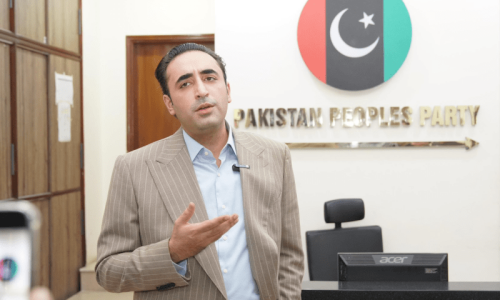The PPP has distanced itself from recently passed legislation that extended the tenure of all three service chiefs, saying that it has no relation with it since it is not part of the federal cabinet.
On November 4, the coalition government bulldozed half a dozen pieces of crucial legislation, through both houses of parliament, despite vociferous protest by the PTI-led opposition.
Showing unprecedented haste, the government got all six bills — seeking to extend the tenure of the chiefs of the country’s three armed forces and increase the number of judges in the superior courts — passed from the National Assembly within 24 minutes, and then from the Senate in just 16 minutes, without allowing any debate.
The bills regarding the judiciary were tabled in both houses by Law Minister Azam Nazeer Tarar, while those related to the services chiefs were introduced by Defence Minister Khawaja Asif through supplementary agendas, after suspending the rules.
A day later, an NA session was adjourned indefinitely after Opposition Leader Omar Ayub Khan’s remarks on the swift legislation were expunged from the record.
Karachi Mayor Murtaza Wahab, also the spokesperson for PPP Chairman Bilawal Bhutto-Zardari, addressed the matter in an interview on DawnNews show ‘Doosra Rukh’ on Sunday.
When asked whether the PPP was on board with changes to the services chiefs’ tenure, Wahab said it was the prerogative of each government how it chose to build its team and who to post at what position.
“The PPP has no relation with the internal matters of the government because we are not a part of the federal government or cabinet,” he said.
“It’s up to the prime minister how he wants to build his team, there’s no direct relation of PPP in this [legislation].”
Wahab noted that at the time of the 26th Constitutional Amendment being passed, the understanding was that there would be as much consensus as possible to avoid objections from various factions after it was passed.
“There was this understanding that when the new judicial commission is formed, the law minister and attorney general of Pakistan would be the federal government’s representatives, and that of the four parliamentarians — consisting of two opposition members and two treasury members — Bilawal was told that two of those seats would go to PPP,” Wahab said.
“Bilawal was of the understanding that not only would PPP get those seats, but he would be part of it so that in the whole process related to courts, there would be a senior political representative who leads his party who would be part of it.”
He conveyed Bilawal’s regret that when the 26th Amendment was passed, the federal government announced that of the two treasury representatives, one would belong to PPP and one to PML-N.
“Based on that, Bilawal made the decision not to be part of it.”
Concerning the change in the number of judges, Wahab emphasised that this was something Bilawal had been saying “from day one”.
“Bilawal said that if you want to properly introduce judicial reforms in the country, you must change the judges’ strength so that there are more judges so that the people can get cheap and speedy justice,” Wahab said.
“This was one of PPP’s demands, and we’re thankful that it was implemented.”
Wahab was asked about Bilawal’s recent comments regarding displeasure with the government’s treatment.
On Thursday, while asserting there was no direct rift with Prime Minister Shehbaz Sharif’s government, Bilawal delivered a scathing critique of his ruling ally, expressing frustration over the “disrespect” felt by his party despite being in the coalition and unmet agreements between the two parties.
The PPP chairman, in an informal conversation with reporters at Bilawal House, also accused the PML-N of reneging on commitments after the 26th Constitutional Amendment’s passage.
He also hinted at a possible review of the PPP’s eight-month alliance in the Centre with the PML-N-led government in the PPP’s upcoming Central Executive Committee meeting, which is expected to be held next month. He said he would present the “facts and ground realities” before party leaders to decide on future strategy.
Elaborating on the situation, Wahab emphasised that relations with the government were not broken just because Bilawal registered his complaints.
“We need to understand that political dialogue is important in political matters. It’s the government’s responsibility to address the reservations of those who support it.
“I am hopeful that whatever reservations Bilawal has shared, better sense will prevail and [the government] accept PPP’s demands,” Wahab said.
He also acknowledged that in recent days the government contacted senior PPP leadership for dialogue.
Following Bilawal’s remarks, PM Shehbaz had promptly tasked Deputy PM Ishaq Dar with addressing Bilawal’s reservations.
Wahab noted that Bilawal had stepped away from political affairs for the time being to be with his family, particularly since his father, President Asif Ali Zardari, was recovering from a leg fracture.
“We have conveyed Bilawal’s point of view, and it is important for the government to understand them.”












































